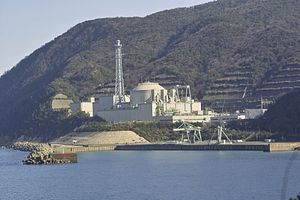While there has been quite a bit of speculation as to whether Kyushu Electric Power Co. would be able to gain approval from all parties in order to restart its two Sendai nuclear reactors, it appears that one of the last significant hurdles will likely be overcome. Nonetheless, there is still wide debate across Japan as to what combination of local and prefectural governments should be consulted before restarts are granted, which are currently being done on a case by case basis. The two reactors located in the city of Satsuma-Sendai in Kagoshima prefecture provide a case study for how future restarts may play out, as the governments there are seeking to limit the influence of nearby municipalities.
In the lead up to this week’s events, Yoichi Miyazawa, the industry and trade minister who replaced Yuko Obuchi, visited the stricken Fukushima Daiichi Nuclear Power Plant on Saturday. Interestingly, Obuchi said shortly before she was forced to resign over a political scandal that “obtaining consent from local communities is not a legal requisite for a restart.” During Miyazawa’s visit, he praised the work of the facility’s employees in the cleanup effort and said it was vital that decommissioning remain on schedule.
On Monday, Miyazawa met with Kagoshima Governor Yuichiro Ito. According to the Jiji Press, he asked the governor for support in the administration’s efforts to restart the two Sendai reactors. He told Ito that “the central government will respond responsibly if an accident occurs and that it hopes the prefecture understands its plan,” while saying that the restart was vital for Japan’s energy policy. Jiji reported that Ito said he “understands the idea of maintaining people’s living standard,” and gave a measure of support.
However, while the governor’s acceptance is key, it is not the only hurdle remaining. The local Satsuma-Sendai municipal assembly approved the restart on October 28, yet the prefectural assembly’s assent is also necessary. However, according to the Asahi Shimbun the votes may already be in hand. There will be assembly deliberations from November 5 to 7, with a plenary session also on the 7th. The Asahi reports that “a majority of the 51-member assembly will approve a petition supporting the resumption of operations of the No. 1 and No. 2 reactors,” with the ruling LDP commanding 35 seats, and several independents and coalition Komeito members expected to also vote in favor.
So while the necessary governmental authorities seem to be in line with the Sendai restart, the debate over exactly how many municipalities and prefectures should be involved in the process is still going strong. An Asahi Shimbun poll published on Tuesday shows that 45 percent of the 155 mayors and governors of the cities and prefectures surveyed believed that local consent of all communities within a 30 km radius of reactors should be consulted before it is restarted. However, only 9 percent of those prefectural and municipal governments that actually host reactors believe that all communities within the 30 km radius should be consulted. Interestingly, only those cities that host nuclear power plants receive financial incentives, while nearby communities claim they bear an equal risk in terms of nuclear disaster.
After Obuchi’s embarrassing scandal, the government of Prime Minister Shinzo Abe does not appear to want to be seen as forcing the issue at all, but rather letting it be decided by the local governments – especially as it seems that in this case both the prefectural assembly and the governor will vote in favor of a restart. The longer-term question will be whether a larger portion of nearby towns and prefectures are allowed to weigh in on the issue. Without the benefit of financial incentives, these communities are likely to be much more hesitant to back a restart (as the poll numbers support), despite the higher overall energy costs and subsequent increased vulnerability of the nation’s energy security.
The national government will likely continue to struggle to convince these communities of the benefits of restarting the country’s nuclear reactors. As the majority of voters live outside the communities that are directly allowed to decide on the issue, this is likely to be a long, uphill battle for the government in Tokyo.
































